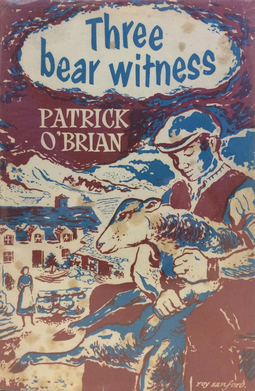Patrick O'Brian, born Richard Patrick Russ, was an English novelist and translator, best known for his Aubrey–Maturin series of sea novels set in the Royal Navy during the Napoleonic Wars, and centred on the friendship of the English naval captain Jack Aubrey and the Irish–Catalan physician Stephen Maturin. The 20-novel series, the first of which is Master and Commander, is known for its well-researched and highly detailed portrayal of early 19th-century life, as well as its authentic and evocative language. A partially finished 21st novel in the series was published posthumously containing facing pages of handwriting and typescript.

Master and Commander is a nautical historical novel by the English author Patrick O'Brian, first published in 1969 in the US and 1970 in the UK. The book proved to be the start of the 20-novel Aubrey–Maturin series, set largely in the era of the Napoleonic Wars, on which O'Brian continued working until his death in 2000.
The Aubrey–Maturin series is a sequence of nautical historical novels—20 completed and one unfinished—by English author Patrick O'Brian, set during the Napoleonic Wars and centring on the friendship between Captain Jack Aubrey of the Royal Navy and his ship's surgeon Stephen Maturin, a physician, natural philosopher, and intelligence agent. The first novel, Master and Commander, was published in 1969 and the last finished novel in 1999. The 21st novel of the series, left unfinished at O'Brian's death in 2000, appeared in print in late 2004. The series received considerable international acclaim, and most of the novels reached The New York Times Best Seller list. These novels comprise the heart of the canon of an author often compared to Jane Austen, C. S. Forester and other British authors central to English literature.

Aidan Higgins was an Irish writer. He wrote short stories, travel pieces, radio drama and novels. Among his published works are Langrishe, Go Down (1966), Balcony of Europe (1972) and the biographical Dog Days (1998). His writing is characterised by non-conventional foreign settings and a stream of consciousness narrative mode. Most of his early fiction is autobiographical – "like slug trails, all the fiction happened."

William John Banville is an Irish novelist, short story writer, adapter of dramas and screenwriter. Though he has been described as "the heir to Proust, via Nabokov", Banville himself maintains that W. B. Yeats and Henry James are the two real influences on his work.

Timothy Harold Parks is a British novelist, author of nonfiction, translator from Italian to English, and professor of literature.
Patrick MacDonogh (1902–1961) was an Irish poet who published five books of poetry in his lifetime. His work is included in the Faber Book of Irish Verse.
Brian Lester Glanville is an English football writer and novelist. He was described by The Times as "the doyen of football writers—arguably the finest football writer of his—or any other—generation", and by American journalist Paul Zimmerman as "the greatest football writer of all time."
John Edward Curtis Prebble, FRSL, OBE, was an English journalist, novelist, and screenwriter. He is known for his books on Scottish history.

Edgar Austin Mittelholzer was a Guyanese novelist. He is the earliest professional novelist from the English-speaking Caribbean. He was able to develop a readership in Europe and North America, as well as the Caribbean; and established himself in London, where he lived almost exclusively by writing fiction. He is considered "the most prolific novelist to be produced by the Caribbean".

Fredric John Warburg was a British publisher, who in 1935 founded the company Secker & Warburg. He is best known for his association with the author George Orwell. During a career spanning a large part of the 20th century and ending in 1971, Warburg published Orwell's major books Animal Farm (1945) and Nineteen Eighty-Four (1949), as well as works by other leading figures such as Thomas Mann and Franz Kafka. Other notable publications included The Third Eye by Lobsang Rampa, Pierre Boulle's The Bridge over the River Kwai, Adolf Hitler's Mein Kampf and William Shirer's The Rise and Fall of the Third Reich.
Maurice Henry Leitch MBE was a Northern Irish author. Leitch's work included novels, short stories, dramas, screenplays and radio and television documentaries. His first novel was The Liberty Lad, published in 1965. His second novel, Poor Lazarus was awarded the Guardian Fiction Prize in 1969, and Silver's City won the Whitbread Prize in 1981.

George Lewis Becke was at the turn of the nineteenth century, the most prolific, significant, and internationally renowned Australian-born writer of the South Pacific region. Having lived and worked among Pacific Islands and Islanders as a trader, ship's supercargo, and villager for some two decades, learning languages and observing natural and cultural life, Becke was prompted by J F Archibald of The Bulletin to write down his experiences, eventually becoming a popular and respected author of short stories, novellas, novels, as well as historic and ethnographic works.
John Fuller FRSL is an English poet and author, and Fellow Emeritus at Magdalen College, Oxford.

Irwin Allan Sealy is an Indian writer. His novel The Everest Hotel: A Calendar was shortlisted for the 1998 Booker prize.

The bibliography of George Orwell includes journalism, essays, novels, and non-fiction books written by the British writer Eric Blair (1903–1950), either under his own name or, more usually, under his pen name George Orwell. Orwell was a prolific writer on topics related to contemporary English society and literary criticism, who has been declared "perhaps the 20th century's best chronicler of English culture." His non-fiction cultural and political criticism constitutes the majority of his work, but Orwell also wrote in several genres of fictional literature.

Hussein, an Entertainment is an early novel by Patrick O'Brian, published in 1938 under his birth name, Patrick Russ. The story takes place in India during the British Raj period and concerns the adventures of a young man named Hussein. The novel, called "an Entertainment" by O'Brian, follows Hussein's life from birth to his late teens. Though out of print for many years, Hussein was reprinted in the late 1990s under Patrick O'Brian's name. Kirkus UK described it as a book "to read for the fun of the 'entertainment' and the light that it throws on the development of one of the great writers of historical fiction."

Testimonies is a 1952 novel, set in North Wales, by the English author Patrick O'Brian. It was first published in the UK under the title Three Bear Witness and in the US as Testimonies. The book was re-issued in 1993 (US) and 1994 (UK), both under the title Testimonies.
John Banville is an Irish novelist, short story writer, adapter of dramas and screenwriter. He has won the Booker Prize, the James Tait Black Memorial Prize, the Franz Kafka Prize, the Austrian State Prize for European Literature and the Prince of Asturias Award for Literature; has been elected a Fellow of the Royal Society of Literature; knighted by Italy; is one of the most acclaimed writers in the English language.

Collected Short Stories is a 1994 collection of stories by the English author Patrick O'Brian. It was published in the US under the title The Rendezvous and Other Stories.












